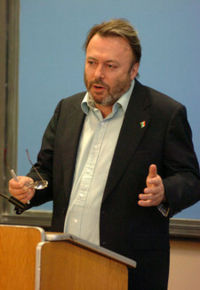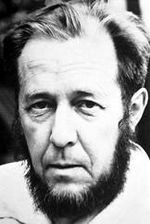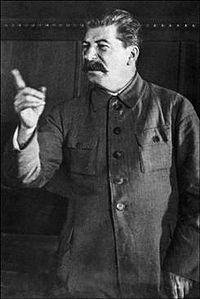Soviet Union And Morality
 From Conservapedia
From Conservapedia 
Peter Hitchens is the ex-atheist brother of atheist Christopher Hitchens. In an article entitled Britain needs God Creation Ministries International wrote about Peter Hitchens:
| “ | Peter wrote that his views changed slowly, as he came to see the fruit of atheism. Part of this realisation came when he was working as a journalist in Moscow, during the final years of the Soviet Union. His depiction of this godless society was sobering. He wrote of the riots that broke out when the vodka ration was cancelled one week; the bribes required to obtain anaesthetics at the dentist or antibiotics at the hospital; the frightening levels of divorce and abortion; the mistrust and surveillance; the unending official lies, manipulation and oppression; the squalor, desperation and harsh incivility. Peter wrote of how traffic stops dead in Moscow when rain begins to fall, as every driver fetches wind-screen wipers from their hiding places and quickly fits them to their holders. Any wipers left in place when the car is parked are stolen as a matter of course.
The atheist, humanistic ideology of the state, he believed, had even affected the Russian language. Peter spoke to a descendant of an exile, whose grandparents had fled Moscow in the days of Lenin. Having been brought up to speak pure Russian in his American home—the elegant, literary language of his parents—he was shocked when he visited Russia to hear the coarse, ugly, slang-infested and bureaucratic tongue that was now spoken, even by educated professionals.[2] |
” |
Contents
- 1 Soviet Union and mass murder
- 2 Mass rape during the occupation of Germany by the Soviet army
- 3 Soviet Union and cannibalism
- 4 See also
- 5 Notes
Soviet Union and mass murder[edit]

See also: Atheism and mass murder
Nobel Prize winner Aleksandr Solzhenitsyn was asked to account for the great tragedies that occurred under the brutal Soviet communist regime he and fellow citizens suffered under.
Aleksandr Solzhenitsyn offered the following explanation:
| “ | Over a half century ago, while I was still a child, I recall hearing a number of old people offer the following explanation for the great disasters that had befallen Russia: 'Men have forgotten God; that's why all this has happened.'
Since then I have spend well-nigh 50 years working on the history of our revolution; in the process I have read hundreds of books, collected hundreds of personal testimonies, and have already contributed eight volumes of my own toward the effort of clearing away the rubble left by that upheaval. But if I were asked today to formulate as concisely as possible the main cause of the ruinous revolution that swallowed up some 60 million of our people, I could not put it more accurately than to repeat: 'Men have forgotten God; that's why all this has happened.' [3] |
” |
Mass rape during the occupation of Germany by the Soviet army[edit]

See also: Mass rape of German women by the Soviet army
The Soviet Union practiced state atheism and militant atheism.
The journalist Peter Hitchens is the ex-atheist brother of atheist Christopher Hitchens and he covered the Soviet Union during its latter years before it collapsed. According to Peter Hitchens, an atheistic society degraded the morals of the Russian people during the Soviet period (see: Soviet Union and morality).[5]
As Allied troops entered and occupied Germany during the latter part of World War II, mass rapes occurred in connection with combat operations and during the occupation which followed. The majority of scholars in the Western World conclude that the majority of the rapes were committed by Soviet servicemen.
The majority of the rapes happened in the Soviet occupation zone. Estimates of the number of German women sexually assaulted by Soviet soldiers have ranged up to 2 million.[6][7][8][9][10] The historian William Hitchcock declared that in many cases women were the victims of repeated rapes, some women experienced as many as 60 to 70 rapes.[11]
After the atheist leader of the Soviet Union Joseph Stalin received a complaint from Yugoslav politician Milovan Djilas about rapes in Yugoslavia, Stalin reportedly said that he should "understand it if a soldier who has crossed thousands of kilometres through blood and fire and death has fun with a woman or takes some trifle."[12] Also, when told that Red Army soldiers sexually assaulted German refugees, Stalin reportedly declared: "We lecture our soldiers too much; let them have their initiative."[13]
Soviet Union and cannibalism[edit]
See also: Atheism and cannibalism
Kerry Kubulius in his article entitled Cannibalism in the Soviet Union wrote:
| “ | In the years 1920-21, the Soviet Union was hit hard by famine. Civil war had wiped out grain stores, and drought affected harvests. Struggling peasants and Gulag prisoners alike fell victim to starvation. Hungry individuals ate what they could find – the last of their livestock, cats and dogs, and then finally, fellow human beings. Cannibalism in Soviet Russia and elsewhere in the Soviet Union manifested itself in prisons camps, in urban settings, and in the countryside. The practice of cannibalism was seen as a survival measure rather than a true crime by those who had nothing else to eat....
It goes without saying that cannibalism in the Soviet Union was outlawed. Those who were caught cannibalizing their fellow citizens were sent to prisons, even though cannibalism was practiced in the Gulag, as well... While some individuals ate the bodies of the already dead, others murdered for the purpose of providing themselves with food. Gangs of children would kill adults, while adults would find children to murder and eat. Escaped prisoners might take along fellow inmates to serve as future meals – unbeknownst to the escapees' companions themselves. Cannibalism in the Soviet Union was sometimes a result of an individual or individuals seeking revenge.[14] |
” |
See also[edit]
- Atheism and communism
- Atheism and morality
- Atheism and mass murder
- Atheism and deception
- Britain and morality
- Atheism and bestiality
Notes[edit]
- ↑ http://www.counterpunch.org/mccarthy02212003.html
- ↑ Britain needs God
- ↑ https://www.icr.org/article/stalins-brutal-faith/
- ↑ Roberts, Andrew. "Stalin's army of rapists: The brutal war crime that Russia and Germany tried to ignore", Daily Mail, 24 October 2008.
- ↑ Britain needs God
- ↑ Heineman, Elizabeth (1996). "The Hour of the Woman: Memories of Germany's "Crisis Years" and West German National Identity". American Historical Review 101 (2): 354–395.
- ↑ Kuwert, P.; Freyberger, H. (2007). "The unspoken secret: Sexual violence in World War II". International Psychogeriatrics 19 (4): 782–784. doi:10.1017/S1041610207005376.
- ↑ BBC - History - World Wars: The Battle for Berlin in World War Two. Bbc.co.uk. Retrieved on 10 December 2014.
- ↑ Hanna Schissler The Miracle Years: A Cultural History of West Germany, 1949–1968 [1]
- ↑ Silence Broken On Red Army Rapes In Germany. NPR.org (17 July 2009). Retrieved on 10 December 2014.
- ↑ Hitchcock, William I. (2004). The Struggle for Europe: The Turbulent History of a Divided Continent, 1945 to the Present. Anchor Books. ISBN 978-0-385-49799-2.
- ↑ Anne Applebaum, Iron Curtain, The Crushing of Eastern Europe, p.32
- ↑ Roberts, Andrew. "Stalin's army of rapists: The brutal war crime that Russia and Germany tried to ignore", Daily Mail, 24 October 2008.
- ↑ Cannibalism in the Soviet Union' by Kerry Kubulius
Categories: [Atheism] [Morality]
↧ Download as ZWI file | Last modified: 02/28/2023 15:35:19 | 69 views
☰ Source: https://www.conservapedia.com/Soviet_Union_and_morality | License: CC BY-SA 3.0
 ZWI signed:
ZWI signed: KSF
KSF